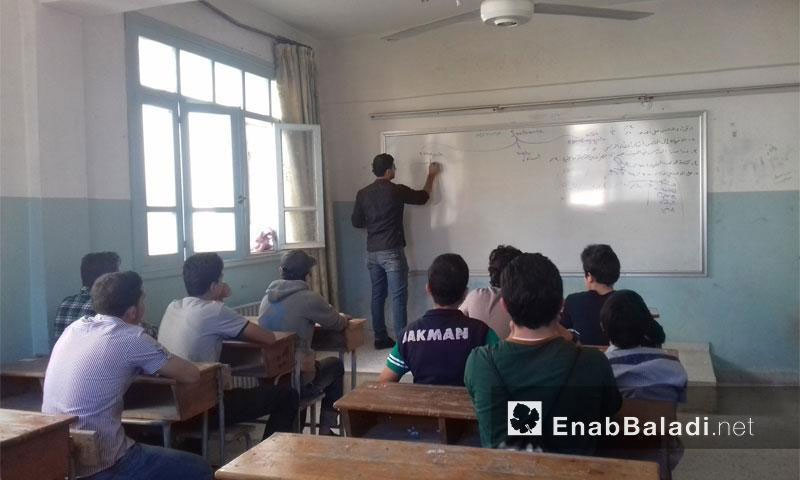



Jisr al-Shugur, western rural Idlib, is anticipating a danger that threatens thousands of students, for funding has been cut off in dozens of the area’s schools.
The threat is manifested in the cuts imposed on funding offered to 61 of the area’s schools, according to Mohammad Saed Qadour, who explained to Enab Baladi that the area used to have 137 active schools. However, at the beginning of the current school year, several school’s funding has been cut, and the teachers continued to work as volunteers.
Qadour pointed out that a certain organization is offering funding to 15 schools, at a rate of 60$ per teacher under the resources available. However, this complicated the situation further, as it triggered tension among volunteer teachers.
Qadour expressed his concerns over the potential total shut down of the schools in case no funding was provided, which threatens to deny 14 thousand students of their right to education.
He pointed out that the Educational Complex has conducted several workshops last November, where many of the area’s organizations were invited as to be informed of the danger. But the plea was not heard.
For his part, Hussian Zaibaq, the Principal of the Boys’ School in Darkush, said that the massive damage that resulted from the funding cuts was that the majority of experienced teachers have joined other schools, which provide $100 as a salary.
He added that half of the staff has given up on the work, creating a gap that has been bridged by teachers who will work voluntarily till the end of this year, expressing concerns over the high rates of students who are abandoning the educational process.
Several solutions were proposed for the sake of the students, according to Qadour, of which are gathering the students within specific schools. However, having more than a thousand students in a single school would result in a catastrophe if the Syrian regime’s air force attacks the school, especially since that the shelling did not completely stop in the Jisr al-Shugur area, in addition to the risk of the students’ movement and their inability to leave their villages.
Under the proposed solutions were also cooperation with the local councils through providing teachers with a single monthly relief basket through donations, which will help them stay at work, in addition to downsizing the attendance hours of both students and teachers to the minimum, for the teachers would be able to work at schools two days a week and thus can work for private institutions for the rest of the days. Though these procedures would affect the educational process, they are a better solution than stopping the process at all.
Another suggestion provided for getting a fee from the students’ parents, according to Qadour, who stressed that students cannot be asked to donate, for this would not suit the people’s financial situation in general, since most of them are below the poverty line and cannot afford more than one thousand Syrian pounds a month.
He added that the last solution was disapproved even if it meant a total suspension of the educational process in some schools.
For its 2018’s evaluation of needs, UN estimated that 69% Syrians are below the poverty line.
For his part, Zaibaq stressed that the state of poverty that is proliferating in the area would prevent the people from paying a fee, which might trigger a massive number of students to drop out school and take refuge in the labor market.
if you think the article contain wrong information or you have additional details Send Correction